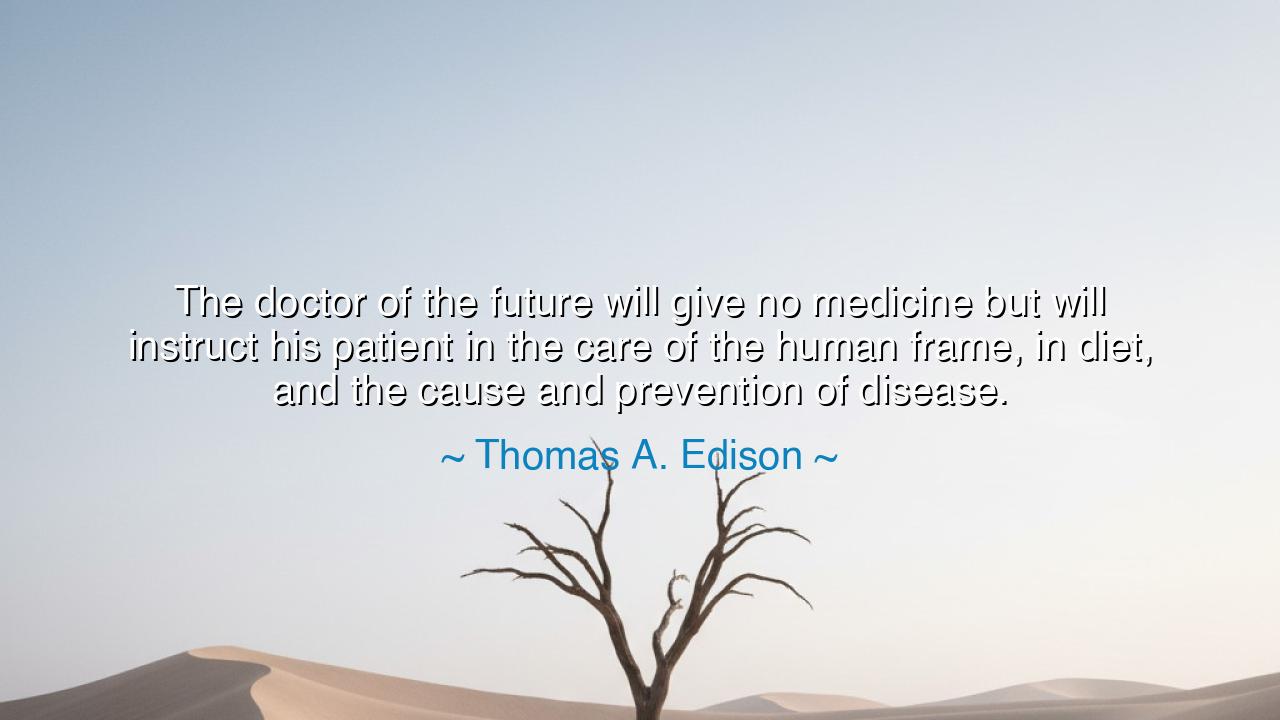
The doctor of the future will give no medicine but will instruct
The doctor of the future will give no medicine but will instruct his patient in the care of the human frame, in diet, and the cause and prevention of disease.






In the depths of human history, there has always been a quest for health, vitality, and longevity. From the philosophers of ancient Greece to the healers of indigenous cultures, humanity has sought ways to unlock the secrets of the human frame—the body that carries us through life. Thomas A. Edison, a man whose brilliance extended beyond the realm of invention, foretold a time when the role of the doctor would shift from the administration of medicine to the guidance of health. His words, “The doctor of the future will give no medicine but will instruct his patient in the care of the human frame, in diet, and the cause and prevention of disease,” point to a future where prevention and holistic care take precedence over the treatment of symptoms. Edison’s vision of healthcare moves beyond the mere management of illness and toward a philosophy of life, where the body is seen as a temple to be cared for with reverence and wisdom.
In the ancient world, the great healers and philosophers often spoke of the balance between the body and mind. Hippocrates, the father of medicine, understood that true health was not merely the absence of disease, but the harmony of the body with its environment. His famous dictum, “Let food be thy medicine and medicine be thy food,” echoed a deep understanding of the body’s natural rhythms and the importance of diet in maintaining wellness. Edison’s vision is a modern echo of these ancient ideas: the doctor of the future is not a mere dispenser of pills, but a guide who helps individuals understand their bodies, their nutrition, and their place within the greater cycle of life.
In many ways, Edison’s idea is not new; it is a return to the wisdom of the ancients, a call to reclaim a more natural and preventative approach to health. The great empires of the past, from the Egyptians to the Greeks, did not rely on the heavy use of medications as we do today. Instead, they relied on the natural world—herbs, dietary practices, and rituals to maintain balance and prevent illness. In ancient Egypt, for example, the role of the priest-healer was intertwined with that of the spiritual guide, teaching the importance of a balanced diet, exercise, and spiritual well-being. This holistic approach, which viewed the body, mind, and spirit as interconnected, mirrors Edison’s vision of a preventative and integrated approach to health.
Consider the story of Benjamin Franklin, a man of great intellect and foresight who, though not a doctor, believed deeply in the preventative measures of good health. He famously said, “An ounce of prevention is worth a pound of cure.” Franklin was not simply speaking about physical health, but about a philosophy of life—one that valued self-care and wisdom over the pursuit of cures for illnesses that might have been avoided through better habits. In this sense, Franklin and Edison are aligned in their vision: the best way to manage health is not through reactive treatment but through active care, a mindset that prioritizes well-being over disease.
In today’s world, we are increasingly seeing a shift toward preventative health. As more and more people turn to nutritionists, fitness experts, and holistic practitioners, Edison’s vision is beginning to take shape. People are becoming more aware of the role that diet, exercise, and lifestyle choices play in maintaining their health. Doctors, though still crucial in addressing acute illnesses, are beginning to take on the role of educators, guiding their patients not only in the treatment of ailments but in the maintenance of vitality. This shift mirrors Edison’s visionary insight—a world where health is not a reactive process but a proactive one, where the focus is on nourishing the body and preventing disease before it takes root.
The lesson that Edison offers us is one of empowerment—the power to take charge of our own health through knowledge, prevention, and the wise care of our bodies. We are not simply victims of disease but participants in the health of our lives. Doctors are not gods who cure us, but guides who help us navigate the path of self-care and wellness. Edison’s future doctor is one who instructs, who provides the tools for individuals to transform their own health through knowledge, action, and understanding of their own bodies. By embracing this vision, we can take greater responsibility for our own well-being and build a world where disease prevention becomes as essential as treatment.
In our own lives, let us take this wisdom to heart. We must educate ourselves about our bodies, our diet, and the ways in which we can prevent disease. The key to living a healthy life lies not just in treating illness, but in the choices we make daily. Just as Edison suggested, it is time to move beyond the narrow view of medicine as merely a cure and embrace a holistic approach to life that includes prevention, self-care, and wisdom in all aspects of our being. We must take up the mantle of the future doctor—one who not only heals but also teaches others how to maintain health, fostering a world where the body is nurtured, not just mended.






AAdministratorAdministrator
Welcome, honored guests. Please leave a comment, we will respond soon